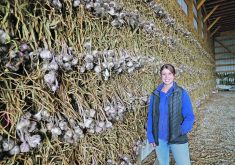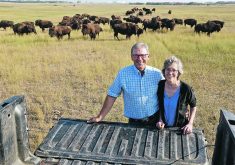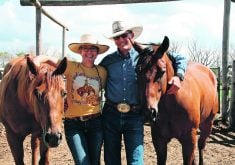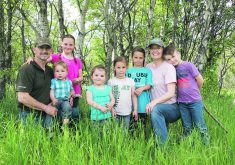On the Farm: Alberta farm is the first outdoor pork operation in Western Canada to achieve Canadian Quality Assurance designation
IRRICANA, Alta. — When a career-oriented couple decided to leave the corporate world behind and become pig farmers, they took the risk of sailing on uncharted waters.
Christopher and Jessica Fasoli started Bear and the Flower Farm in 2015, where they raise outdoor pigs near Irricana. Their pork sales have skyrocketed.
They have experimented with breeds, feed and marketing techniques. Most recently they became the first outdoor pork operation in Western Canada to achieve Canadian Quality Assurance, a recognized national standard for pork quality, rearing techniques, traceability and transportation. They worked with the Canadian Pork Council and Alberta Pork to design and set standards for outdoor pigs. They also follow a strict biosecurity plan to keep the pigs as healthy as possible.
Read Also

Nutritious pork packed with vitamins, essential minerals
Recipes for pork
“We are about the science behind farming because it is a craft choosing your genetics, feed along with the weather. We ended up getting better and better,” said Jennifer.
Returning to the farm was a major lifestyle choice for them.
“It has been the craziest three years of my life. If you would have told me I was going to be a pig farmer I would have laughed,” she said.
“It was the best thing that ever happened to us.”
Christopher’s family owned a manufacturing company with sub-assembly factories, where he worked hard and was paid well. However, he wanted to step away and do something different.
“Today I still work like a mule and don’t get compensated as much, but I am a billion times happier and 80 pounds lighter,” he said.
“Our lifestyle has changed, but I don’t think our quality of life has decreased since leaving the corporate world. In fact, I think our quality of life has increased substantially.”
It all started in 2013 when Christopher’s family sold their cattle, and the young couple started their own place on a nearby quarter section. They got their first pigs on Halloween of 2015 and sold four in January 2016. The feedback was lukewarm.
They looked for a correction and introduced Large White Landrace-Duroc crosses. They wanted well-marbled meat without the excess fat deposited on the backs and bellies.
They work with a breeder at Three Hills, Alta., who handles the farrowing, and the weaned pigs arrive at their farm at about 55 pounds every Wednesday. Pigs arrive year round because they are killing 60 to 80 head per week. Another breeder sends pigs every month.
They are also starting a sow facility to house 300 females with a goal to expand to 2,700. They are also adding 50 acres of land.
The pigs were not on pasture in the summer of 2018 because of a major flood. Instead, the pigs are sorted into pens with new outdoor feeders, waterers and huts for shelter. The manure is cleaned out of the pens, composted and then spread on their hay fields.
Producing better pork means working with a nutritionist, who has developed a proprietary feed of wheat, barley and peas. Flax, probiotics and prebiotics as well as a balanced nutrient package complete the ration. No genetically modified feed is used and the pork contains 0.9 grams of omega-3 fatty acids because of the inclusion of flax in the diet.
Once they had pork to sell, Jennifer steeled up her courage and started visiting chefs with a product line. Today the farm is selling pork through three national distributors to supply 26 retailers and a number of restaurants. Their next coup is selling pork to the Calgary Stampede in 2019.
“We have a different business model from all of our competitors. All of our competitors have a butcher shop,” Jennifer said.
“We decided to be the opposite. We wanted the butcher shops to be our customers so we could do what we were really good at and that is raising an outdoor pig.”
Learning about pigs meant asking lots of questions. They had to learn how to handle pigs humanely and they had to study pork cuts.
“You just do it. When you have got to pay your bills, you go through everything,” she said.
Mentors include everyone from veterinarians to officials at Alberta Pork.
“There have been incredible people who helped us. We are exciting to them,” she said.
Like all meat merchants, they learned that some cuts are more popular. They have asked chefs to consider offering a product mix that may include trim and sausages.
“If they want our tomahawk chop, they need to support us in other ways,” she said.
Edmonton and Calgary are their main markets, but they also ship hogs to Chilliwack, B.C., every two weeks, where they are slaughtered and the pork shipped to Vancouver and eventually Asia.
They have also learned to work with employees. Jessica’s mother, Terry Langford, works in the office, and they have a chief financial officer and two hired men. They need more full-time staff and hope the promise of good wages and the chance to work outdoors will help lure more employees.
Their third anniversary of production is this December. People told them it would take years to develop a market and that they would be lucky to sell 25 pigs a week.
“There is more and more demand for this product than any of us could supply,” Jessica said.
With so much activity in three years time, there is little room for vacation but lots of time is spent discussing how big they want to grow.
They know they are the face of the company, and customers want to meet the people who produce the product. They have to take time from working outdoors with the pigs to shake hands with new and old customers. Christopher is 38 and Jessica is 31, which makes them part of the millennial and Generation Z demographic, who want documentation and third party audits about everything that happens on the farm. The Fasolis can accept that demand.
And while this farm has surpassed its owners’ expectations, they remain business people at heart.
“It has to make sense to us from a business perspective and everyone involved makes a profit,” said Christopher.


















